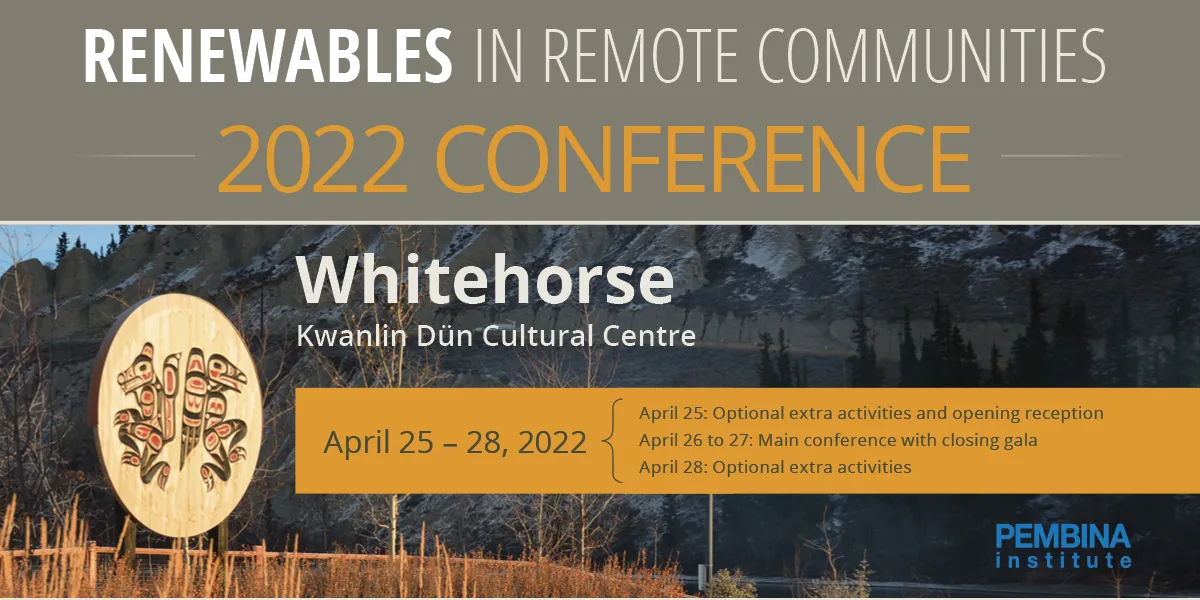Advancing the business case for clean energy in remote communities
Conference details
The conference is now over! View the conference program and presentations, or read the summary report!
RiRC2022 is a four-day event at the Kwanlin Dün Cultural Centre, Whitehorse Yukon from April 25 to 28, 2022. The two-day main conference, supplemented by activities on the pre-conference and post-conference days, focuses on the collaboration, climate and energy policies and the financial pathways for renewable project proponents necessary to advance the business case and further accelerate an Indigenous-led clean energy transition in remote communities across Canada.
The Pembina Institute will produce and disseminate research on progress to date on reducing remote community reliance on diesel as a source of power , measuring reductions against targets; updates on energy policies as they affect remote communities; updates on reforms made to the costing structures used by utilities; and a summary and assessment of financial policies and opportunities to attract private sector financing through government policy action. All materials will be forwarded to participants prior to the conference and will help facilitate discussion and collaboration.
RiRC2022
The 2022 RiRC conference will bring together stakeholders, decision makers and leaders working in and with clean energy projects in remote communities. With the goal of accelerating an Indigenous-led transition to clean energy in remote communities, key areas will be covered including:
- Financial opportunities for private financing and private/public investment strategies
- Climate and energy polices as they affect remote communities
- The regulatory changes required for more flexibility in costing structures that inform power purchases
- Actions required to strengthen the business case for sustainable investments in renewables
The conference will highlight the importance of social and economic reconciliation as central to a just energy transition and the ways in which the United Nations Declaration on the Rights of Indigenous Peoples (UNDRIP) can advance Indigenous leadership in clean energy.
Overview
Presentations, panel discussions and round-table collaboration will take place over two plenary days of the four-day conference. These sessions will allow participants to share knowledge, expertise, and lessons learned from their work in clean energy. Topics of discussion will cover opportunities to attract private financing through sound and consistent climate and energy policies and ways to accelerate the clean energy transition using market-based approaches that enable ownership and leadership opportunities for Indigenous communities.
Days one and four are dedicated to providing space for Indigenous leaders, project proponents, clean energy companies, utilities, academia, government and interested parties to host informal discussions and offer presentations on topics of their choosing. Sessions will be held at the Kwanlin Dün Cultural Centre. A Call for Proposals for these sessions will be issued in late December and the schedule will be announced in March 2022.
Conference objectives
- Network, share, collaborate and build relationships among stakeholders from a broad range of backgrounds and fields of expertise in the energy sector.
- Recognize and celebrate the successes of Indigenous-led clean energy projects and learn more about remote communities and their path to clean energy.
- Explore how better financial approaches, funding models, energy policy and regulatory changes will accelerate the transition to clean energy in remote communities and attract investment.
- Highlight enduring policies that prioritize Indigenous sovereignty and open new opportunities to Indigenous communities. Establish practical next steps and forecast how best to build on momentum in support of accelerating the clean energy transition in remote communities
Conference outcomes
- Continue to build collaborative, strong relationships
- Conference proceedings summarizing the information shared at the conference
- Further collaboration mechanisms and a plan to develop a roadmap for a continued reduction in the use of diesel
NEW THIS YEAR! You can also attend RiRC 2022 virtually
All the sessions taking place during the two-day plenary will be livestreamed. Some of the sessions and presentations offered on the day before and the day after the plenary will also be hosted virtually. Attendees will be able to access the sessions online through our Whova platform which includes interactive features to allow participants to still feel connected to the conference and engaged with the activities and discussion. Our hope is to increase accessibility to the conference by extending it to anyone unable to travel due to COVID-related or any other challenges.
Research
The RiRC2022 conference materials that will be distributed prior to the conference will provide an in-depth consideration of the following issues:
![]() Indigenous clean energy progress and aligning with Canada’s climate commitments — How far have we come, how far do we have to go and how are we tracking against Canada’s commitments to reduce diesel dependency in remote communities?
Indigenous clean energy progress and aligning with Canada’s climate commitments — How far have we come, how far do we have to go and how are we tracking against Canada’s commitments to reduce diesel dependency in remote communities?
 Financial policies to improve the business case — Analysis of different policies to improve the economic reality of remote community projects, and how government policies can support greater access to capital. Separately, a report on how ESG, socially responsible, and impact investing from the private sector can support Indigenous-led clean energy projects. The report will also cover how government investment and policies support and attract new revenue streams.
Financial policies to improve the business case — Analysis of different policies to improve the economic reality of remote community projects, and how government policies can support greater access to capital. Separately, a report on how ESG, socially responsible, and impact investing from the private sector can support Indigenous-led clean energy projects. The report will also cover how government investment and policies support and attract new revenue streams.
 Utility business model reform — The business model employed by utilities is not aligned with Canada’s climate targets. How can the business model be reformed to enable remote communities to accelerate energy efficiency and renewable energy projects? Our research examines the changes needed in the utility sector and regulatory environment to support more Indigenous-led energy projects.
Utility business model reform — The business model employed by utilities is not aligned with Canada’s climate targets. How can the business model be reformed to enable remote communities to accelerate energy efficiency and renewable energy projects? Our research examines the changes needed in the utility sector and regulatory environment to support more Indigenous-led energy projects.
Registration
If you have any questions regarding the conference, please contact Madeleine Whitestone.
Program
Click on the title to learn more about each presentation, and to download the slide shows.
Pre-conference day: Mon., April 25, 2022
Schneider Electric: Efficient fuel-saving for off-grid microgrids
 The UN sustainability development goal 7 focuses on ensuring access to affordable, reliable, and clean energy for all. Despite major investments that have been made in recent years, many northern and remote communities continue to rely on diesel generators to meet their energy needs. In this talk, I will talk about the energy landscape of remote Canadian communities and explore how Schneider Electric’s microgrid solutions (products and software) can help reduce the reliance on the Diesel power generation.
The UN sustainability development goal 7 focuses on ensuring access to affordable, reliable, and clean energy for all. Despite major investments that have been made in recent years, many northern and remote communities continue to rely on diesel generators to meet their energy needs. In this talk, I will talk about the energy landscape of remote Canadian communities and explore how Schneider Electric’s microgrid solutions (products and software) can help reduce the reliance on the Diesel power generation.
SPEAKER: Abhik Bera, Microgrid Solution Architect, Schneider Electric
Wind Heat North & Paulatuk Energy Working Group: Building a workforce and a village energy model - Paulatuk pathway to 100% renewable energy
 Wind Heat North will introduce the Beaufort Hamlet Energy Initiative, the Paulatuk Energy Working Group (PEWG pronounced "peg"). The PEWG was formed in March 2021 with the purpose of transitioning the Hamlet of Paulatuk, NWT to 100% renewable energy over the next decade.
Wind Heat North will introduce the Beaufort Hamlet Energy Initiative, the Paulatuk Energy Working Group (PEWG pronounced "peg"). The PEWG was formed in March 2021 with the purpose of transitioning the Hamlet of Paulatuk, NWT to 100% renewable energy over the next decade.
The PEWG is financial supported by CERRC/NRCan, Northern REACHE and has a growing list of supporters and partners. Wind Heat North is facilitating the PEWG and collaborating with key partners from across Canada and Alaska to help Paulatuk build its capacity to own and operate a wind park with energy storage.
SPEAKERS:
- Jean-Paul Pinard, Partnership, Wind Heat North
- Grace Nakimayak, Energy Coordinator, Paulatuk Energy Working Group
Kisik Clean Energy: Off-Grid First Nation Renewable Clean Energy Project Stories
 Learn about Sayis Dene First Nation and what is being planned for reducing diesel powered electricity in this remote Manitoba off grid First Nation.
Learn about Sayis Dene First Nation and what is being planned for reducing diesel powered electricity in this remote Manitoba off grid First Nation.
SPEAKERS:
- Darrell Brown, President, Kisik Clean Energy
Yukon Conservation Society: Electric Thermal Storage in the North
 The Yukon Electric Thermal Storage (ETS) Demonstration Project is led by Eric Labrecque at the Yukon Conservation Society and funded by Natural Resources Canada and the Yukon Government. The project has set out to demonstrate the benefits of ETS in the Yukon and other northern jurisdictions. We are specifically assessing the benefits of ETS for the Yukon and how to address the challenges that ETS may face in the North. We're also investigating how the installation and use of ETS should be incentivized in the Yukon and other jurisdictions.
The Yukon Electric Thermal Storage (ETS) Demonstration Project is led by Eric Labrecque at the Yukon Conservation Society and funded by Natural Resources Canada and the Yukon Government. The project has set out to demonstrate the benefits of ETS in the Yukon and other northern jurisdictions. We are specifically assessing the benefits of ETS for the Yukon and how to address the challenges that ETS may face in the North. We're also investigating how the installation and use of ETS should be incentivized in the Yukon and other jurisdictions.
To date, 35 homes across southern Yukon - from new builds to 100-year-old log cabins - have had ETS systems installed as their main source of heat, drawing power from the Yukon’s power grid during off-peak times. 10 more homes will see their ETS systems installed this year. Baseboard, space heater, furnace, and hydronic boilers are all included in the project, providing a wide breadth of ETS system types and participating home types. This has all in an effort to slow the rise of the Yukon’s peak demand while encouraging the adoption of more intermittent renewable energy in the Yukon.
As the only ETS project of its kind north of the 49th parallel – let alone the 60th – we have set out to show communities, governments, and utilities across Canada, and especially in the North, that ETS can accelerate our collective quest for a future free from our decades-long reliance on fossil fuel heating and power generation.
SPEAKER: Eric Labrecque, Project Manager, Yukon Conservation Society
Nergica: Kudos on commissioning, but what’s next now?
 Renewable energy projects are major endeavours that are often considered over once the infrastructures are commissioned. Roll up your sleeves, the project is not over yet! While steps subsequent to commissioning are regularly overlooked, they are essential to ensure the resiliency of the infrastructures. System monitoring, infrastructure ownership and funding for the early stages of operations are some key examples. In this talk, we’ll share stories and advice from various remote communities that we supported in their sustainable transition objectives. We’ll also share some lessons we learned from operating our own microgrid.
Renewable energy projects are major endeavours that are often considered over once the infrastructures are commissioned. Roll up your sleeves, the project is not over yet! While steps subsequent to commissioning are regularly overlooked, they are essential to ensure the resiliency of the infrastructures. System monitoring, infrastructure ownership and funding for the early stages of operations are some key examples. In this talk, we’ll share stories and advice from various remote communities that we supported in their sustainable transition objectives. We’ll also share some lessons we learned from operating our own microgrid.
SPEAKERS:
- Antoine Amossé, Expert analyst, Nergica
- Alexandra Gellé, Knowledge broker, Nergica
The Pembina Institute: Utility Business Model Reform Research
 A summary of the Pembina Institute's paper, "Transforming the Utility Business Model", discussing o pportunities to reform the regulatory and business models of utilities servicing remote communities, presented by lead author, Emily He. This presentation will dive into the solutions for utility business model reform and will provide necessary background information for Thursday's "Utility Engagement Working Group session".
A summary of the Pembina Institute's paper, "Transforming the Utility Business Model", discussing o pportunities to reform the regulatory and business models of utilities servicing remote communities, presented by lead author, Emily He. This presentation will dive into the solutions for utility business model reform and will provide necessary background information for Thursday's "Utility Engagement Working Group session".
SPEAKER: Emily He, Analyst, Pembina Institute
Watch the RiRC2022 Conference Plenary recordings on YouTube, or read the summary report!
Conference Day 1: Tues., April 26, 2022
Welcome, reviewing goals and objectives of conference
SPEAKERS:
- Joe Copper Jack, Ta’an Kwach’an Council
- Linda Coady, Executive Director, Pembina Institute
- Dave Lovekin, Pembina Institute
Diesel reduction progress in remote communities, Indigenous leadership and opportunities coming
Presentations and discussion on progress towards reducing remote and northern communities' dependence on diesel over the past several years, a look at Indigenous leadership in the clean energy sector across Canada and stories from Indigenous leaders on their journey in clean energy.
SPEAKERS:
- Chief Dana Tizya-Tramm, Chief, Vuntut Gwitchin First Nation
- Judith Sayers, President, Nuu-chah-nulth Tribal Council
- Dave Lovekin, Pembina Institute
- Chris Henderson, Executive Director, Indigenous Clean Energy (ICE)
MODERATOR: Chris Severson-Baker, Senior Director, Industrial Decarbonization, Pembina Institute
Government policy and program development to support the clean energy transition in remote communities
A discussion on government climate and energy policy framework s in the context of the Pan -Canadian Framework on Climate Change, latest announcement and direction of federal and the Government of
Yukon policies supporting remote communities’ clean energy journey, and perspectives on what will be required to accelerate diesel reduction efforts and support Indigenous leadership in remote communities.
MODERATOR: Graeme Reed, AFN
SPEAKERS:
- Hon. John Streicker, Minister of Energy, Mines and Resources and Minister responsible for the Yukon Development Corporation and the Yukon Energy Corporation, Yukon Ministry of Energy, Mines and Resources
- André Bernier, Director General, Electricity Resources Branch, Natural Resources Canada
- Anita Walker, Crown-Indigenous Relations and Northern Affairs Canada
- Chris Henderson, Executive Director, Indigenous Clean Energy (ICE)
- Linda Coady, Executive Director, Pembina Institute
Trailblazing Indigenous clean energy projects
Stories of leading Indigenous clean energy projects, their journey and insight into their challenges and successes.
MODERATOR: Dave Lovekin, Pembina Institute
SPEAKERS:
- Raymond Lamont, Tsay Keh Dene
- Brigam Miller, Tsay Keh Dene band
- Ayla Brown, Heiltsuk Tribal Council
- Phil Climie, Retrofits Program Manager, Ecotrust Canada
- Erika Tizya, Vuntut Gwitchin Government
- Rosa Brown, Energy Coordinator, Vuntut Gwitchin Government
Indigenous partnership in clean energy projects
 Sharing various partnerships between Indigenous clean energy projects and other stakeholders , and the strengths behind these partnerships
Sharing various partnerships between Indigenous clean energy projects and other stakeholders , and the strengths behind these partnerships
MODERATOR: Mathieya Alatini, Chief Strategist, GSD Strategies
SPEAKERS:
- Andrew Hall, President & CEO, Yukon Energy Corporation
- Peter Kirby, Taku River Tlingit First Nation
- Grant Sullivan, Nihtat Energy
- Mike Ocko, Director Thermal Division, Northwest Territories Power Corporation
- Blaine Chislett, Sakku Investments
- Malek Tawashy, CEO, Northern Energy Capital
UNDRIP and Indigenous rights for clean energy projects
 Sharing stories of reconciliation in action, discussion on the connection between UNDRIP legislation and principles and clean energy opportunities and a discussion on what tangible application of UNDRIP looks like in provincial and federal law as it relates to clean energy.
Sharing stories of reconciliation in action, discussion on the connection between UNDRIP legislation and principles and clean energy opportunities and a discussion on what tangible application of UNDRIP looks like in provincial and federal law as it relates to clean energy.
MODERATOR: Kory Wilson, BCIT / Advisory Committee
SPEAKERS:
- Judith Sayers, President, Nuu-chah-nulth Tribal Council
- Bruce McIvor, Partner, First Peoples Law
- AJ Esquega, Gull Bay First Nation
- Aphrodite Salas, Professor and Journalist Concordia University
- Jordyn Burnouf, Senior Associate Medicine Rope Strategies

Conference Day 2: Wed., April 27, 2022
Reclaiming Energy Sovereignty: Clean Energy Solutions for the Haíɫzaqv by the Haíɫzaqv
Please join the Haiɫ́ zaqv Climate Action Team to hear their story of the develop of the community-led Haí ɫzaqv Community Energy Plan. This plan is a major step towards our community transition away from diesel. A critical transition to protect our homelands and waterways, for our future generations. The plan lays out clean energy solutions for and by the Haíłzaqv Nation. As Haíɫzaqv people our way of life is deeply impacted by the changes in our environment caused by climate change. This plan represents healthier homes, affordable energy, greater food security, clean jobs, economic opportunities and a sustainable future for the Haíɫzaqv people. We are proud to offer this plan as an example of a local government finding local solutions to the climate crisis.
As a Nation we are actively working together h̓íkila qnṭs n̓ála’áx̌v (protecting our world). We invite each of you to come share space with us and listen to our story. The story of shifting the reality for the Haiɫ́ zaqv Nation, building off the work of our ancestors to continue to build a sustainable energy future that upholds our ǧvı̓ḷás (ancestral laws).
SPEAKERS:
- Ayla Brown, Heiltsuk Tribal Council,
- Q̓átuw̓as Brown, Community Engagement Coordinator, Haiɫ́ zaqv Climate Action Team
- Astrid Wilson-Lewis, Haíɫzaqv Climate Action Youth Intern, Heiltsuk Nation
- Eryn Stewart, Managing Director, Indigenous Clean Energy
Trailblazing Indigenous clean energy projects on the horizon
 Stories of Indigenous clean energy projects that are in the feasibility, planning or development stages and what is setting them apart.
Stories of Indigenous clean energy projects that are in the feasibility, planning or development stages and what is setting them apart.
MODERATOR: Tyler Jobb, CEO, Jobb Developments
SPEAKERS:
- Mihskakwan James Harper, Business Development Manager, NRStor Inc.
- Shivani Chotalia, Director, Development & Partnerships NRStor Inc.
- Grant Sullivan, Nihtat Energy
- Jamie Capot-Blanc, Project Coordinator, Tu Deh Kah Geothermal
Market advancements and access to private capital
Discussion on non-government financial investors providing debt capital, those interested in climate and clean energy financing, and new investment strategies needed to support financing for large-scale diesel reduction efforts.
MODERATOR: Linda Coady, Executive Director, Pembina Institute
SPEAKERS:
- Hillary Thatcher, Canada Infrastructure Bank
- Ernie Daniels, First Nation Finance Authority
- Vince Gasparro, Managing Director, Corporate Development & Clean Energy Finance Vancity Community Investment Bank
- Nate Lowbeer-Lewis, VP, Canada, Spring Lane Capital
Opportunities for economic reconciliation
Sharing stories of economic reconciliation in B.C., along with academic insight and research into Indigenous energy sovereignty, shared decision-making and respectful collaboration with Indigenous People and how lessons can be applied to the Indigenous clean energy transition.
SPEAKERS:
- Sarah Ozog PhD Student, Simon Fraser University
- Chief Leanne Joe, Trustee Squamish Nation
- Paul Kariya, Coastal First Nations
- Jonathan Boron, PhD Student, Simon Fraser University
- Sean Brennan, Energy Coordinator & Implementation Manager, Haida Nation
Youth engagement and participation in remote community clean energy projects
Youth-led panel discussion on the opportunities for capacity building and leadership amongst Indigenous youth in the clean energy transition. Discussion on the role youth is playing in the next generation of Indigenous leaders and how youth will be at the forefront of advancing the remote community clean energy landscape.
MODERATOR: Jordyn Burnouf, Senior Associate, Medicine Rope Strategies
SPEAKERS:
- Dakota Norris, Coordinator, Northern and Indigenous Sustainable Energy Initiatives, University of Saskatchewan
- Mihskakwan James Harper, Business Development Manager, NRStor Inc.
- Larissa Crawford, Managing Director, Founder Future Ancestors Services
- Danielle Kehler, Program Participant Student Energy
Conference closing and key messages, grand prize
A facilitated table discussion, creating space for conference participants to reflect on day two plenary sessions and determine actions and next steps. Grand prize draw.
SPEAKERS:
- Darrell Brown, President, Kisik Clean Energy
- Linda Coady, Executive Director, Pembina Institute
Post-conference Day: Thurs., April 28, 2022
YAB Management: Use of Torrified Wood Pellets in Eastern Canada's Remote Communities
 In the last five years, YAB Management has been involved in the development of biomass projects in the northeast of Canada for application in remote communities and mining projects. In this session, we will review some of the economics and financial considerations for the use of this type of biomass in remote northern sites. Examples of applications will be used to illustrate these points. Two of the main issues, its transportation and storage components will be presented with current and proposed solutions during the session. Discussions on these topics will follow.
In the last five years, YAB Management has been involved in the development of biomass projects in the northeast of Canada for application in remote communities and mining projects. In this session, we will review some of the economics and financial considerations for the use of this type of biomass in remote northern sites. Examples of applications will be used to illustrate these points. Two of the main issues, its transportation and storage components will be presented with current and proposed solutions during the session. Discussions on these topics will follow.
Since 2002, YAB Management provides customized consulting and management services in the Canadian North. Through its experience and knowledge of the Northern regions and collaborative partnerships with Inuit and First Nations communities, YAB Management provides proven, tailored solutions that minimize risks and contribute to the immediate success of business operations and projects.
SPEAKERS:
- Jean Schiettekatte, Vice President YAB Management
- Jimmy Royer, Renewable Energy Consultant Solener
Natural Resources Canada: Indigenous Off-Diesel Initiative: Energy Champions discuss projects and experience
 This session will convene the Energy Champions participating in NRCan's Indigenous Off-Diesel Initiative. Come listen to the Energy Champions share their incredible clean energy journeys and join an honest conversation about the success of the program, challenges with federal funding and where we need to go from here!
This session will convene the Energy Champions participating in NRCan's Indigenous Off-Diesel Initiative. Come listen to the Energy Champions share their incredible clean energy journeys and join an honest conversation about the success of the program, challenges with federal funding and where we need to go from here!
Stephanie will be joined by:
- Vince Robinson, Clean Energy Project Manager, Nuxalk Nation
- Sean Brennan, Energy Coordinator, Haida Nation
- Grant Sullivan, President, Nihtat Energy Ltd.
- Tim Tutcho, Community Energy Champion, Deline Got'ine Government
- Tyler Jobb , Founder and Owner, Jobb Developments
- Siobhan Slade, Project Manager, NunatuKavut Community Council
- Jason Aitchison, Project Manager, Societe Kuujjuamiut Inc.
SPEAKERS:
- Stephanie Zimmerling, NRCan
- Meaghan Bennett, A/Director, Natural Resources Canada
Indigenous Services Canada: Economic Development Programming to Support Indigenous Involvement within the Clean Energy Sector
 SPEAKER: Rachelle Boone, Indigenous Services Canada
SPEAKER: Rachelle Boone, Indigenous Services Canada
Getting Off Fossil Fuels: Kivalliq Region Grid Extension Case Study
 While grid extensions are not always available to remote Canadian communities, the communities in the Kivalliq region of Nunavut are seeking to connect to Manitoba Hydro's network. This proposal offers the opportunity to go beyond electricity, but to also include building heating and potentially electric vehicles. This study examines the options for a power line extension, including using district heating to minimize diesel backup requirements.
While grid extensions are not always available to remote Canadian communities, the communities in the Kivalliq region of Nunavut are seeking to connect to Manitoba Hydro's network. This proposal offers the opportunity to go beyond electricity, but to also include building heating and potentially electric vehicles. This study examines the options for a power line extension, including using district heating to minimize diesel backup requirements.
SPEAKERS:
- Tim Weis, Industrial Professor, Mechanical Engineering, University of Alberta
- Julia Zonneveld, Research Assistant, University of Alberta
- Faith Nobert, Research Assistant ,University of Alberta
Regional Community Energy Plan: An Online Platform
 Communities have develope energy plans for years; however, these become a single snapshot of the community that seldom gets updated or their information is up-to-date when a project opportunity comes.
Communities have develope energy plans for years; however, these become a single snapshot of the community that seldom gets updated or their information is up-to-date when a project opportunity comes.
With this in mind, we developed an online platform to present the Community Energy Plan where information can be updated on a regular basis. Furthermore, as communities join the platform, we can create a Regional Community Energy Plan that can help identify joint opportunities.
The objective is to help communities better identify opportunities, leading to develop project proposals and be able to verify the impact of the expected results of the projects.
This project is led by the Independent First Nation Alliance (IFNA) and Mohawk College.
Project funded by: Natural Resources Canada - Clean Energy for Rural and Remote Communities Program
SPEAKERS:
- Mariano Arriaga, General Manager - Energy and Power Innovation Center Mohawk College
- Jordan Beardy, Energy Specialist, Independent First Nation Alliance
Advisory Committee
For this year’s conference, we are pleased to be working with our seven-person Indigenous Advisory Committee. This committee brings great insight and knowledge on clean energy development in Indigenous communities.
Darrell Brown
 Darrell Brown is a Cree business owner based in Winnipeg. Darrell is President of Kisik Clean Energy and Kisik Commercial Furniture. He is a 2004 founding member and current chair of the Aboriginal Chamber of Commerce based in Manitoba.
Darrell Brown is a Cree business owner based in Winnipeg. Darrell is President of Kisik Clean Energy and Kisik Commercial Furniture. He is a 2004 founding member and current chair of the Aboriginal Chamber of Commerce based in Manitoba.
He holds an Advanced Diploma in International Business from Red River College in Manitoba and a Certificate of Indigenous Leadership, Governance and Management Excellence from the Banff Centre. Darrell holds the designation of ICD.D from The Rotman, Directors Education Program through The Institute for Corporate Directors. Darrell also holds a certificate in the 20/20 Catalyst program focusing on the Indigenous Renewable Energy Sector. Darrell is the newly elected chair of the Indigenous Clean Energy Network, a social enterprise to advance renewable energy for indigenous people across Canada.
Paul-Emile McNab
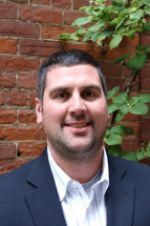 Paul-Emile is the vice president of Business Development and Membership Experience at the Canadian Council for Aboriginal Business. Paul-Emile has been active in the field of research, consulting, fundraising and business development for the past15 years. In 2007, he completed his honours degree in history, political science and Canadian studies at the University of Toronto. In 2010, he completed his masters in environmental studies at York University with a focus on Indigenous knowledge and a major research paper titled The Traditional Rights of Ways on the Walpole Island First Nation. He has served as a member of the Research Advisory Committee with Canadian Energy Research Institute, the chair of the National Advisory Committee with ORIGIN Inc. and the current vice president of the board of directors for Aboriginal Legal Services. He currently resides in Toronto and is an avid follower of sports and business.
Paul-Emile is the vice president of Business Development and Membership Experience at the Canadian Council for Aboriginal Business. Paul-Emile has been active in the field of research, consulting, fundraising and business development for the past15 years. In 2007, he completed his honours degree in history, political science and Canadian studies at the University of Toronto. In 2010, he completed his masters in environmental studies at York University with a focus on Indigenous knowledge and a major research paper titled The Traditional Rights of Ways on the Walpole Island First Nation. He has served as a member of the Research Advisory Committee with Canadian Energy Research Institute, the chair of the National Advisory Committee with ORIGIN Inc. and the current vice president of the board of directors for Aboriginal Legal Services. He currently resides in Toronto and is an avid follower of sports and business.
Grant Sullivan
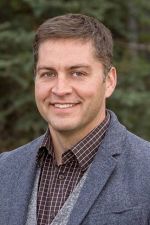 Grant Sullivan is the president of Nihtat Energy Ltd. Prior to that he was the Executive Director of Gwich’in Council International for 10 years, and he was employed by Beaufort Delta Health and Social Services as a Financial Controller. Grant has also owned and operated his own small business and enjoys the challenges of being a contractor. Grant attended primary and secondary school in Inuvik, NT then moved on to earn a Bachelor of Management with a Major in Finance, from the University of Lethbridge in Alberta. Although Grant was born and raised in Inuvik, NT, he presently resides with his family in Whitehorse, Yukon.
Grant Sullivan is the president of Nihtat Energy Ltd. Prior to that he was the Executive Director of Gwich’in Council International for 10 years, and he was employed by Beaufort Delta Health and Social Services as a Financial Controller. Grant has also owned and operated his own small business and enjoys the challenges of being a contractor. Grant attended primary and secondary school in Inuvik, NT then moved on to earn a Bachelor of Management with a Major in Finance, from the University of Lethbridge in Alberta. Although Grant was born and raised in Inuvik, NT, he presently resides with his family in Whitehorse, Yukon.
Kory Wilson
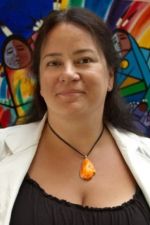 Kory comes to BCIT most recently from Vancouver Community College where she served as Director, Aboriginal Education and Community Engagement since 2011. Kory is Chair of the National Indigenous Education Committee of Colleges and Institutions Canada and a Global Access to Post-Secondary Education Ambassador. Kory has a law degree from UBC. With over 20 years of experience in post-secondary education, community development, and the legal profession, Kory’s passion lies “in ensuring success for Indigenous Learners and other multi-barriered learners”. She has a deep commitment to education and has dedicated her working life to ensuring that under-represented learners succeed, both within learning institutions and the larger community.
Kory comes to BCIT most recently from Vancouver Community College where she served as Director, Aboriginal Education and Community Engagement since 2011. Kory is Chair of the National Indigenous Education Committee of Colleges and Institutions Canada and a Global Access to Post-Secondary Education Ambassador. Kory has a law degree from UBC. With over 20 years of experience in post-secondary education, community development, and the legal profession, Kory’s passion lies “in ensuring success for Indigenous Learners and other multi-barriered learners”. She has a deep commitment to education and has dedicated her working life to ensuring that under-represented learners succeed, both within learning institutions and the larger community.
Kory is a member of the We Wai Kai Nation (Quadra Island) and is Musgamagw Tsawataineuk and Laich-Kwil-Tach. Both nations are part of the Kwakwaka’wakw Nation, also known as the Kwak’wala speaking people.
Judith Sayers
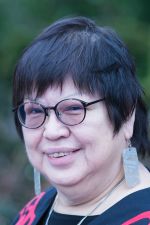 Judith is the president of the Nuu-Chan-nulth Tribal Council and Adjunct Professor with the Gustavson School of Business and the School of Environmental Studies at the University of Victoria. She has been involved in the Clean Energy industry since 2001 when her First Nation undertook to develop clean energy and decided on the 6.5 MW China Creek Run of the River project. As Chief of her First Nation, she was instrumental in the development of that project. That project has been operational since 2005. Judith has been the Visiting National Aboriginal Economic Development Chair and an Assistant Professor at the Faculty of Business and Law at the University of Victoria and in that role facilitated economic development with indigenous peoples and helped organize Clean Energy conferences.
Judith is the president of the Nuu-Chan-nulth Tribal Council and Adjunct Professor with the Gustavson School of Business and the School of Environmental Studies at the University of Victoria. She has been involved in the Clean Energy industry since 2001 when her First Nation undertook to develop clean energy and decided on the 6.5 MW China Creek Run of the River project. As Chief of her First Nation, she was instrumental in the development of that project. That project has been operational since 2005. Judith has been the Visiting National Aboriginal Economic Development Chair and an Assistant Professor at the Faculty of Business and Law at the University of Victoria and in that role facilitated economic development with indigenous peoples and helped organize Clean Energy conferences.
Judith served fourteen years as Chief of the Hupacasath First Nation, located in Port Alberni, BC. As Chief of her First Nation, she focused on capacity building and sustainable development. She is also the Chair of the New Relationship Trust Foundation, Co-Chair of the Island Corridor Foundation, Co-Chair of the Joint Working Group on First Nations Heritage Conservation and on the board of the BC Achievement Foundation.
Jordyn Burnouf
 Jordyn Burnouf is a member of Black Lake First Nation and from the Métis community of Île-à-la-Crosse, SK. Jordyn is Advisor to the vice president of the Métis Nation—Saskatchewan. With a strong passion for, and relationship with the land, Jordyn’s work is centred on clean energy and environmental initiatives with a focus on land-based teachings, cultural inclusion, and youth engagement.
Jordyn Burnouf is a member of Black Lake First Nation and from the Métis community of Île-à-la-Crosse, SK. Jordyn is Advisor to the vice president of the Métis Nation—Saskatchewan. With a strong passion for, and relationship with the land, Jordyn’s work is centred on clean energy and environmental initiatives with a focus on land-based teachings, cultural inclusion, and youth engagement.
Jordyn is a part of Indigenous Clean Energy’s national initiative, Bringing it Home’ to address the housing and energy needs of First Nations, Metis, and Inuit communities in Canada. Jordyn continues to advocate and create space for youth and women in the energy sector in Canada as Co-Chair of the SevenGen Indigenous Youth Council and co-founder of SevenGen’s newest mentorship and project development program, ImaGENation. Jordyn is a member of the Indigenous Clean Energy board of directors and Efficiency Canada’s governing council.
Mihskakwan James Harper
 Mihskakwan James Harper is from Sturgeon Lake Cree Nation in Treaty 8, Alberta. He graduated from the University of Manitoba with a Bachelor of Science in mechanical engineering and holds a Master of Science in renewable energy from KTH Royal Institute of Technology and Ecole Polytechnique.
Mihskakwan James Harper is from Sturgeon Lake Cree Nation in Treaty 8, Alberta. He graduated from the University of Manitoba with a Bachelor of Science in mechanical engineering and holds a Master of Science in renewable energy from KTH Royal Institute of Technology and Ecole Polytechnique.
His master’s program featured research on climate action and access to affordable and clean energy for all, and how clean energy projects can act as a pathway towards sovereignty, economic empowerment, and climate action. He has also worked with the Yellowhead Institute on the interconnectedness of energy, health, and sovereignty. Mihskakwan James Harper continues to advocate for meaningful climate action through the lens of his Niheyaw upbringing, tying together clean energy, long-term community well-being, sovereignty, and empowerment. His recent work on co-hosting the Decolonizing Power podcast series furthers this passion to share inspiring stories about how clean energy and community well-being are deeply interconnected. He currently works as the Business Development Manager with an energy storage developer, NRStor Inc.
He loves his family and his community now and generations ahead, which inspires him to work on energy storage and renewable energy projects to build a future that is sustainable and empowers all.
Travel and hotel information
Indigenous travel support
We are pleased that we were able to offer support for Indigenous community members to attend RiRC2022. Thank you to our sponsors for their assistance.
Hotel information
Thank you to the Best Western Gold Rush Inn, the Edgewater Hotel, the Raven Inn and the Sternwheeler Hotel for accommodating our guests.
Airlines
Thank you to Air Canada and Air North.
Sponsors
Platinum+ sponsors

Gold sponsor

Silver sponsors

Bronze sponsors

Opening reception sponsor

Closing reception sponsor

Lunch sponsor

Snack sponsor

Indigenous travel support

Contact us
Conference lead – Dave Lovekin
Conference communication lead – Victoria Foote
Sponsorship and partnerships – Samantha Ward
- See details of the 2017 conference in Whitehorse.
- See more about the Pembina Institute's Renewables in Remote Communities work.
